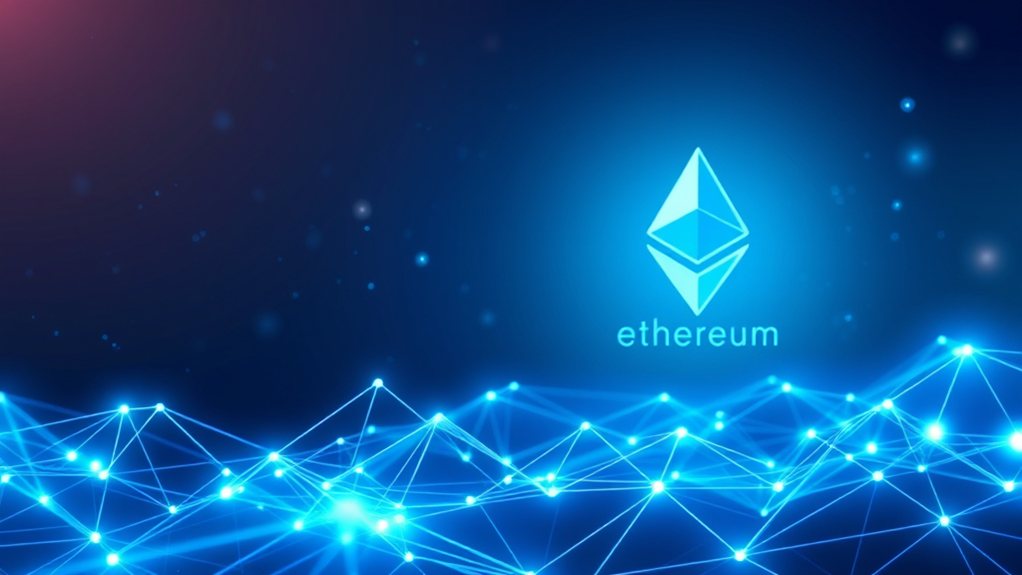Polygon is a Layer 2 scaling solution for Ethereum, launched in 2017 as Matic Network and rebranded in 2021. It processes transactions on separate chains before finalizing them on Ethereum, reducing congestion and fees. With its native MATIC token, Polygon can handle up to 65,000 transactions per second with block times of 2.1 seconds. The platform supports thousands of decentralized applications across DeFi, NFTs, and gaming. More details reveal its growing ecosystem.

Although it began as Matic Network in 2017, Polygon has emerged as one of the leading solutions to Ethereum's scalability problems. Founded by Jaynti Kanani, Sandeep Nailwal, and Anurag Arjun, the platform was designed to overcome Ethereum's limitations of slow transaction speeds and high fees. In February 2021, the company rebranded from Matic Network to Polygon, marking a shift toward becoming a more all-encompassing scaling platform. The project gained early support through funding rounds that raised $450,000 in 2019.
Polygon functions as a Layer 2 scaling solution for Ethereum. This means it processes transactions on separate chains and then finalizes them on the main Ethereum network. The technology uses a Proof-of-Stake consensus mechanism and incorporates the Plasma Framework. What makes Polygon special is its ability to support multiple scaling solutions, including sidechains and zk-rollups. This approach keeps Polygon fully compatible with Ethereum while greatly improving its performance. Polygon achieves its efficiency by processing transactions off-chain, which significantly reduces pressure on the main Ethereum network.
Polygon supercharges Ethereum by processing transactions off-chain while maintaining compatibility through its multi-solution approach.
The network's native cryptocurrency is called MATIC. This token serves several important purposes within the Polygon ecosystem. Users need MATIC to pay transaction fees, participate in network governance, and stake as validators. The token has a maximum supply cap of 10 billion and exists as an ERC-20 token, making it compatible with the Ethereum ecosystem. MATIC is widely available on major cryptocurrency exchanges like Coinbase and Binance. The platform employs advanced consensus algorithms to enhance security and protect against various forms of cyber threats.
Polygon's performance metrics show why it's gained popularity. The network can handle up to 65,000 transactions per second with an average block time of just 2.1 seconds. Compared to Ethereum, Polygon offers considerably lower fees, which has attracted over 7,000 decentralized applications to the platform. By 2021, Polygon was serving more than 300,000 daily active users.
The platform supports a wide range of applications. These include decentralized finance (DeFi) protocols, NFT marketplaces, gaming platforms, and enterprise solutions. Polygon has integrated with major DeFi protocols like Aave and Curve. It's also formed partnerships with traditional companies such as Ernst & Young and luxury brand Dolce & Gabbana. Popular blockchain projects like Decentraland and OpenSea have expanded to Polygon. The platform's high throughput capabilities make it particularly suitable for NFT and gaming applications that require fast and cost-effective transactions.
Looking ahead, Polygon continues to develop new technologies. The team is implementing zk-rollups to further increase scalability and working on Polygon Avail to improve data availability. They're also focusing on cross-chain interoperability and expanding enterprise adoption.
Polygon aims to become Ethereum's "internet of blockchains" by creating an all-encompassing ecosystem of connected networks that maintain Ethereum's security while overcoming its limitations.
Frequently Asked Questions
How Do I Stake MATIC for Passive Income?
Staking MATIC for passive income requires a few simple steps. Users can stake through the Polygon website, validator delegation, liquid staking protocols, or centralized exchanges.
They'll need an EVM-compatible wallet with MATIC tokens and ETH for gas fees. The minimum staking amount is 1 MATIC, with annual returns between 4-8%.
After staking, rewards accumulate automatically. There's a 3-4 day waiting period when unstaking funds.
Which Wallets Support Polygon's MATIC Token?
MATIC tokens can be stored in several wallet types.
Hardware options include Ledger Nano S/X, Trezor Model T, KeepKey, CoolWallet S, and Bitbox02.
Popular software wallets supporting MATIC are MetaMask, Trust Wallet, MyEtherWallet, Atomic Wallet, and Exodus.
Exchange wallets from Binance, Coinbase, Kraken, Gemini, and KuCoin also support MATIC.
DeFi solutions include Argent, Rainbow, Dharma, Zerion, and Gnosis Safe.
What Are the Risks of Investing in MATIC?
Investing in MATIC comes with several risks.
The token's price is highly volatile, often swinging over 50% in short periods.
Technical vulnerabilities could affect Polygon's network security.
Regulatory uncertainty looms as authorities might classify MATIC as a security.
The project faces competition from other Layer 2 solutions and Ethereum's own scaling technologies.
Centralization concerns exist with Polygon's limited validator set of only 100 validators.
Can I Build My Own Dapp on Polygon?
Yes, developers can build their own decentralized applications (dApps) on Polygon.
The platform provides multiple tools including the Polygon SDK, Remix IDE, and Truffle Suite for smart contract development. Builders can code in Solidity, Vyper, or other compatible languages.
The typical process involves creating contracts locally, testing on Mumbai testnet, and then deploying to the Polygon mainnet.
Polygon's infrastructure supports various application types from standard dApps to privacy-focused solutions.
How Does Polygon Compare to Other Layer-2 Scaling Solutions?
Polygon outperforms many Layer-2 solutions with its 65,000 transactions per second capacity, exceeding Arbitrum (40,000) and Optimism (2,000).
It maintains penny-sized fees, lower than zkSync and StarkNet.
With over 7,000 dApps and $5.2 billion locked in its ecosystem, Polygon's adoption surpasses newer competitors like Base and Linea.
However, it's considered less decentralized than some rollup solutions, while offering a wider variety of scaling technologies.














